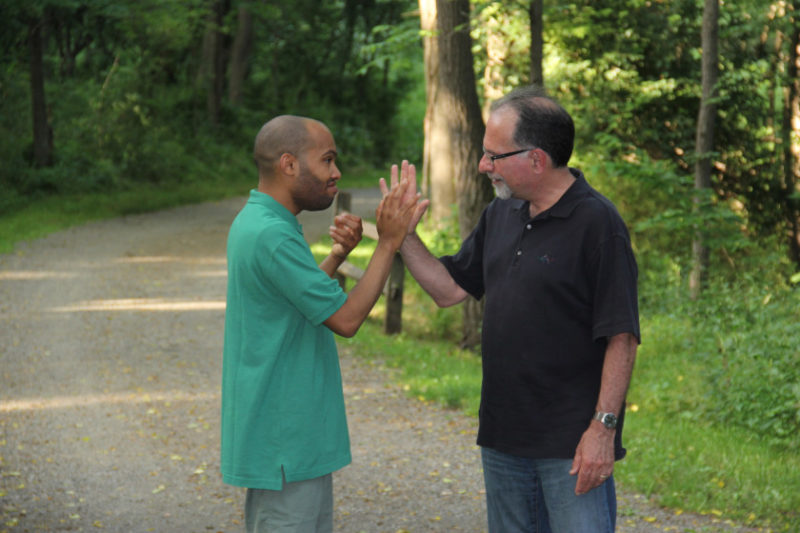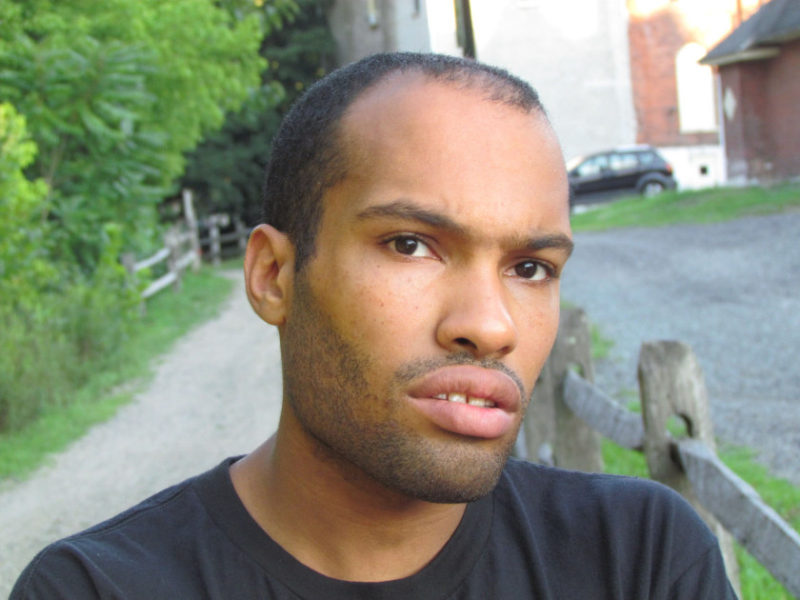My son, Tariq, is turning 40 this November. He is autistic, as well as nonspeaking, and he has a severe intellectual disability. Like many other parents of nonspeaking autistic children, I have had imaginary conversations with him many times over the years, and I wonder what he would tell me if he could speak.

Tariq giving his dad, Dr. Robert Naseef, a high five
If Tariq could speak, here is what I think he would tell me:
First – It’s Not About You, It’s About Me
No one died, so please don’t mourn for me. You didn’t get to play baseball with me, or build model airplanes, or do science experiments. We don’t have philosophical conversations, but we do have a relationship. Working through your grief about the loss of the relationship you expected was necessary for you to get on with your life. That’s about you, but it has nothing to do with me. It’s about your dreams and expectations that through no fault of either of us, were unmet.
Autism is not a thing I have, but it is my way of being. It colors every perception, thought, emotion, and experience. I wouldn’t be the same person without it. You talk about dreaming new dreams, so focus on that and on the relationship we do have. None of us are happy all of the time, but I am happy most of the time. Please remember that I love you, and I like spending time with you and don’t want you to be sad.
Second – Be Patient
I understand why you tried so hard to change me, and I’m glad you stopped! Even now when you are impatient with how I naturally act, that feels bad to me. When I hear or sense your disappointment in me, I feel the negativity. Even though I cannot speak in words, I can see, and hear, and feel. I can tell what’s going on with you, and every day I know who is kind and who is mean to me. When people are kind and patient, we get along so much better, and I can do more.
I’ve seen you experience a rocky stress-filled road of getting services and learning how to make a difference in dealing with my autism as an evolving condition. To get the services that I needed, you needed to convince people about how severe my challenges are which was hard for you to highlight. You would get angry and worried and lose sleep over it. The result was more grief and negative thinking. Once again that affected me, but was all about you, not me. Thanks for advocating for my needs though. Fortunately, those days are over. I am safe.
Third – Be Positive
Just like neurotypical children, I need positive energetic parents who enjoy life, celebrate my accomplishments, and accept me as I am. When I don’t understand what you are expecting, I get confused and frustrated. Positive reactions to what I can do feel good. You often measure my accomplishments in inchstones instead of milestones. That’s an improvement, Dad, but must you still measure them at all? I’m proud of whatever I’m able to accomplish even when to others it can seem very small. Recently, for example, I started helping my staff in the kitchen. I like stirring whatever’s in the pot, and I now put my dishes in the sink. I also make sure everyone is wearing their seatbelt when we go out, and I always hang up my coat when I get home. I smile when you take selfies with me because you seem to like that. I continue to need your help, understanding, and support in many ways.
Fourth – Let Go of Your Anger
You’ve written about how the loss of the perfect son you dreamed of was difficult for you. You wanted to change me but I could not be fixed or cured. That made you angry. When you were angry around me, it did not feel good. I never wanted to be fixed or cured. It’s not my fault that I wasn’t the child you were expecting or waiting for. I am the only way I know how to be and like everyone, I am sometimes happy and sometimes sad. You didn’t have a clue about how I felt. Once again that was about you because you wanted to fix me.
You finally learned to celebrate what I could do. This made a huge difference for me in our relationship. I was still a young child and it made me feel happier, when you seemed to truly enjoy me and accept me as I am. When you were constantly pushing me to do the things that seem ‘typical’, I was frustrated and cranky. When you played with me and followed my lead, I laughed and smiled because I felt happy.

Tariq Naseef
Fifth – Accept and Appreciate Me
I know everyone has expectations. Please don’t make yours too low or too high. When people’s expectations of me are too low, it seems like they’ve given up on me, but I can do things. Yet, when expectations are too high and I cannot reach them, I become extremely frustrated. I have expectations too, you know. As your son, I expect you to love me and hang in there with me, no matter what. Some of my autistic peers make progress in leaps and bounds while others like me develop very slowly. There is a lot that I cannot do and will never do. While both of us work hard and persist in our own ways, I know that my outcomes did not always match your expectations.
Through it all, I have loved you and you love me. I know that your love for me is unconditional. When you were trying to change me, it sometimes felt like there were conditions. But I see and feel and know now that you love me unconditionally. Despite your best efforts, and mine, I have never learned to speak, read, or write. Thanks to your love and advocacy on my behalf, I live the safest life possible for me in a group home where I can live with support out in the world. I love our car rides and walks in the park when you visit.
These days, when you come to visit, I feel a calmer presence with you which brings me happiness as you have come to balance and live with acceptance and appreciation. Keep up the good work, Dad.
Going Forward to a Deepening Understanding
Tariq has a cohort of autistic adults who are a growing chorus which contributes profoundly to understanding autism. Trailblazing Jim Sinclair wrote “Don’t Mourn for Us” in 1992, https://www.autreat.com/dont_mourn.html, While some amount of grief is normal, getting stuck there, according to Sinclair “is damaging for both the parents and the child, and precludes the development of an accepting and authentic relationship between them.” The real grief in Sinclair’s view is not autistic people themselves, but rather that our world has no place for them (or you can say – does not create space for them. Parents are urged to get angry about that and change this situation.
For anyone who wants to understand autism at a deepened human level, listen to and read the advice of autistic adults who are self-advocates, for starters:
- Temple Grandin proclaims that she is “Different but not less.”
- Dena Gassner teaches, “You don’t outgrow autism, you grow into it.”
- Michael John Carley says, “Acceptance is a start not a finish.”
- Jennifer O’Toole says “The face of autism is changing. And more often than we realize, that face is wearing lipstick.”
- Stephen Shore says, “If you know one child with autism, you know one child with autism.”
Keep listening to voices of autistic people that, unlike my son, have been able to communicate in ways you can understand, and keep reading the work of the Autistic Self Advocacy Network (https://autisticadvocacy.org/).
Robert Naseef, PhD, is a psychologist and father of an adult son with autism. His latest book is Autism in the Family: Caring and Coping Together (2013) by Brookes Publishing. He can be contacted at RNaseef@altenativechoices.com, and he blogs at drrobertnaseef.wordpress.com.
This article was originally published on November 17, 2019, and is reprinted with permission. The original article can be found at https://drrobertnaseef.wordpress.com/2019/11/17/if-my-son-could-speak/.





